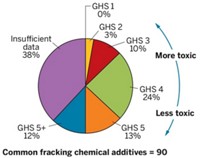Advertisement
Grab your lab coat. Let's get started
Welcome!
Welcome!
Create an account below to get 6 C&EN articles per month, receive newsletters and more - all free.
It seems this is your first time logging in online. Please enter the following information to continue.
As an ACS member you automatically get access to this site. All we need is few more details to create your reading experience.
Not you? Sign in with a different account.
Not you? Sign in with a different account.
ERROR 1
ERROR 1
ERROR 2
ERROR 2
ERROR 2
ERROR 2
ERROR 2
Password and Confirm password must match.
If you have an ACS member number, please enter it here so we can link this account to your membership. (optional)
ERROR 2
ACS values your privacy. By submitting your information, you are gaining access to C&EN and subscribing to our weekly newsletter. We use the information you provide to make your reading experience better, and we will never sell your data to third party members.
Environment
Designing Greener Chemicals Award: Cargill
A Nontoxic Vegetable-Oil-Based Insulating Fluid For High-Voltage Transformers Is An Improvement Over Petroleum-Based Mineral Oil
by Stephen K. Ritter
December 13, 2013
| A version of this story appeared in
Volume 91, Issue 50
Biobased chemicals firm Cargill landed the Designing Greener Chemicals Award for developing Envirotemp FR3, a vegetable-oil-based dielectric insulating fluid for high-voltage transformers. The oil, already being used in a half-million transformers, outperforms and is less flammable and less toxic than commonly used petroleum-based mineral oil.
Transformers hanging on utility poles and situated in electrical substations and large buildings are essential devices that must be filled with an insulating fluid to dissipate heat and prevent short-circuiting. Polychlorinated biphenyls, or PCBs, were ideal for the application. But because of their toxicity, the compounds were banned in the late 1970s. Although the mineral oil, a mixture of C15 to C40 alkanes, is significantly less hazardous than PCBs, it is flammable and not readily biodegradable and can be toxic to fish and other aquatic species. Cargill’s Envirotemp FR3, made from soybean oil and viscosity-controlling polymer additives, overcomes these problems.

Cargill’s oil also significantly extends the lifetime of transformers. Besides the dielectric fluid, transformers include a solid insulating material, which is usually wood, paper, or cardboard. As the cellulose in those materials degrades over time, it forms water as a by-product and accelerates the degradation process. Mineral oil is hydrophobic, so any additional water that creeps into a transformer is taken up by the solid insulation as well. Because the time interval for servicing transformers depends on the life of the solid insulators, using comparatively hydrophilic vegetable oil helps prevent cellulose degradation and extend insulator service life.
The development comes at an opportune time when aging power grid infrastructure is being replaced. When using Cargill’s fluid, transformers can be designed to be smaller and lighter, which in turn means less insulating fluid is needed—up to 15% less—and less transformer construction material such as copper, steel, and solid insulator are needed.
“Using a naturally occurring soybean-based material, rather than an oil-based material derived from our petroleum reserves, just makes sense,” says chemistry professor Bruce H. Lipshutz of the University of California, Santa Barbara, a 2011 Presidential Green Chemistry Challenge Award winner. “The fringe benefits are noteworthy, such as the need for smaller transformers that require less insulating fluid and don’t catch fire, biodegradability of the oil, and the natural and thus renewable source of soybean oil.”
According to a life-cycle assessment, a transformer using Envirotemp FR3 reduces the carbon footprint by about 55 times relative to a transformer that uses mineral oil. And even with more than 500,000 transformers filled with millions of gallons of Cargill’s insulating fluid in use, there have been no known explosions or fires. The fluid is also not harmful to fish in toxicity tests.
“The Presidential Green Chemistry Challenge Award is validation of our efforts to successfully develop and implement a renewable, sustainable replacement for a petroleum-based product with application benefits,” says Cargill senior chemist Kevin J. Rapp. “Our accelerating rate of demand for the product across the globe is a testament to the value of protecting public health and the environment.”





Join the conversation
Contact the reporter
Submit a Letter to the Editor for publication
Engage with us on Twitter